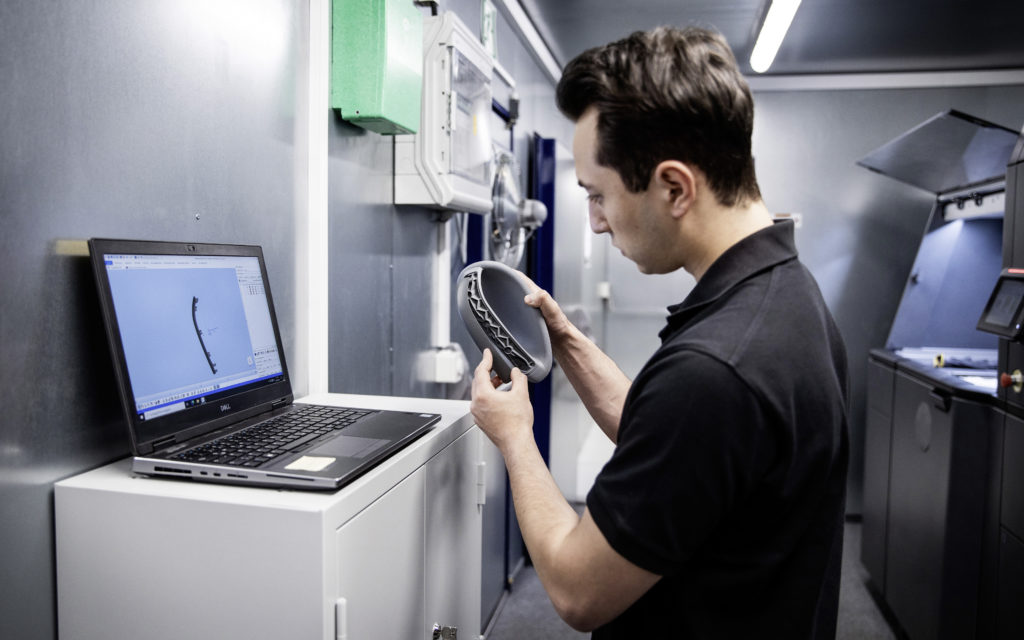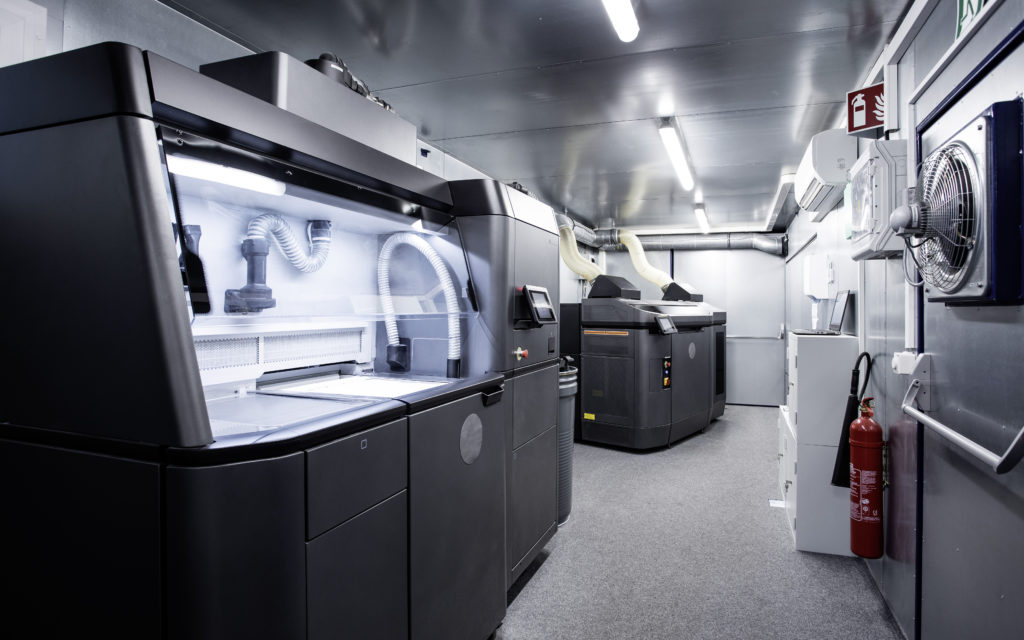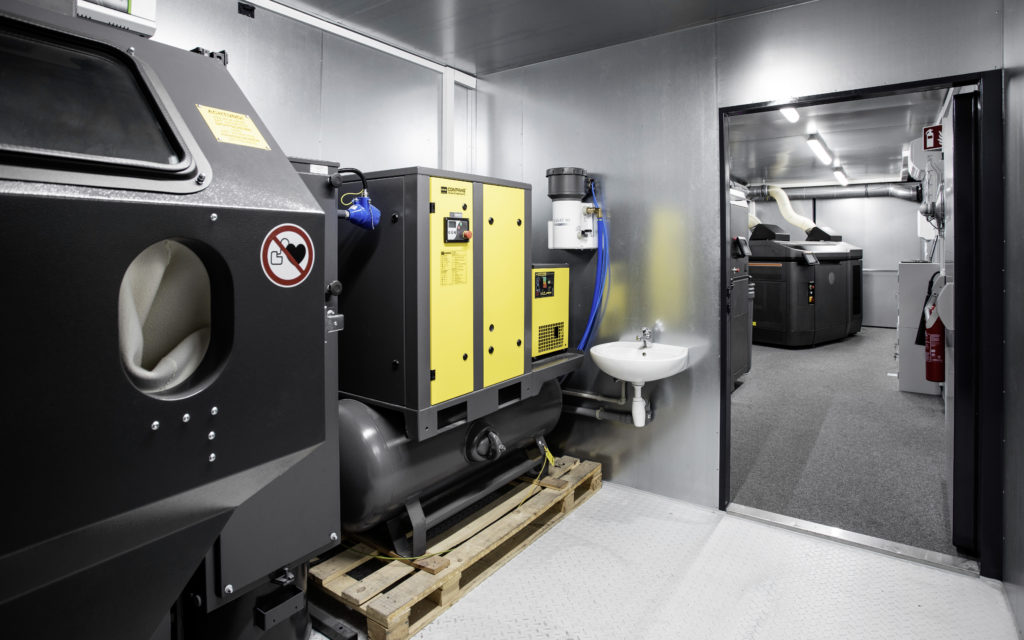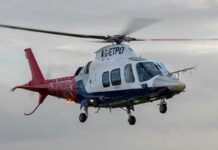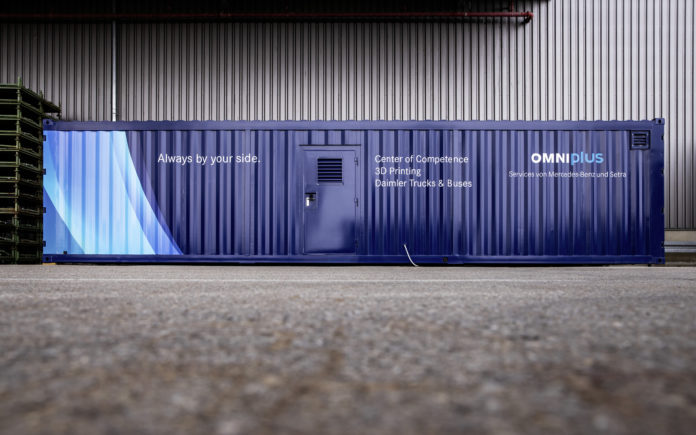
“Mobile Smart Factory”, “Portable 3D Printing Factory”, and now “mini factory” or “mobile printing centre”…The names vary from one organization to another but the ultimate goal of the concept remains the same: being able to achieve in situ additive manufacturing. The concept comes at a time when decentralised production of 3D printed parts has become pivotal to help certain teams far away from conventional manufacturing facilities.
Here is the thing, behind the first two mentioned concepts, lie AM technologies providers while Daimler Buses and its service brand Omniplus are at the heart of the “mini factory” concept. Well, it is no secret that Daimler Buses is an advocate for AM technologies, the question is, why would a bus manufacturer need a mobile printing centre?
Bernd Mack, Head of Customer Services & Parts at Daimler Buses provides a first response: “thanks to the mobile 3D printing centre, we can exploit the advantages of 3D printing to a greater extent and further increase the speed at which we supply spare parts. Decentralised production of parts as required avoids warehousing costs and reduces transportation routes. Thus, 3D printing not only allows us to react fast, flexibly and economically to customer requirements but to also improve our ecological footprint for the production of spare parts.”
From a practical standpoint, the pilot container from Neu-Ulm will be in operation at the BusWorld Home (BWH) service centre in Hamburg. As a result, the service centre in Hamburg that already offers a range of services for Mercedes-Benz and Setra buses will be able to quickly produce spare parts inhouse. Physical transportation routes are thus further reduced and the spare part is at the customer’s site even faster. Thanks to the expertise of BWH Hamburg in the field of painting, the spare parts can be refined directly, according to customer requirements. Daimler Buses is thus setting up a further production facility for 3D printed spare parts at the BWH Hamburg – in addition to the internal industrial 3D printing centre in parts production in Neu-Ulm.
What does the “mini factory” imply?
Available in the form of a container, the “mini factory” integrates all the manufacturing processes required to produce 3D printed parts. Equipped with an industrial 3D printed that occupies an area of 36m2, operators could produce high-quality polyamide parts that can meet Daimler AG’s production standards for injection-moulding and deep drawn parts.
In the twelve by three metre container, operators could prepare 3D printing data at a CAD work station prior to the printing process. The automotive company explains that the required powder is prepared at a processing station where the printed spare part is also freed from residue powder in a final step. A blasting system and an air compressor are located in an adjacent room: the blasting system smooths the surface of the component parts for a perfect finish. Here, the printed spare parts can also be painted in a limited range of colours. The compressor provides the systems with compressed air. The container is also equipped with an industrial vacuum cleaner, an air filter and an air conditioning system.
From physical to digital warehousing
Using 3D printing Daimler Buses can react fast and flexibly to urgent customer requirements, for example when customers order rarely required parts or have special requests. Instead of a wait of several weeks as for conventional spare parts, production and delivery of a 3D printed part takes only a few days. Just under 40,000 bus spare parts are already 3D printable today.
Ralf Anderhofstadt, Head of the “Center of Competence 3D-Printing” at Daimler Buses and his team are currently focussing on around 7,000 parts that are being successively digitised. Some of these are already available only as 3D printed spare parts after having undergone the relevant digitisation steps, approval processes and numerous product tests and are stored in the “digital warehouse” together with the necessary printing information. In a next step, Daimler Buses intends to further expand and decentralise the business model: customers will then be able to purchase 3D printing licences from the “commerce” section of the Omniplus On portal and have the corresponding parts produced in a 3D printing centre certified by Daimler Buses.
As printing centres of this kind are still uncommon, these mobile mini factories represent an expansion of the planned business model. Right now, a mobile mini factory can be transported by truck to any location. Once there, only electricity and an internet connection are required for its operation.
Remember, you can post job opportunities in the AM Industry on 3D ADEPT Media free of charge or look for a job via our job board. Make sure to follow us on our social networks and subscribe to our weekly newsletter : Facebook, Twitter, LinkedIn & Instagram ! If you want to be featured in the next issue of our digital magazine or if you hear a story that needs to be heard, make sure to send it to contact@3dadept.com



